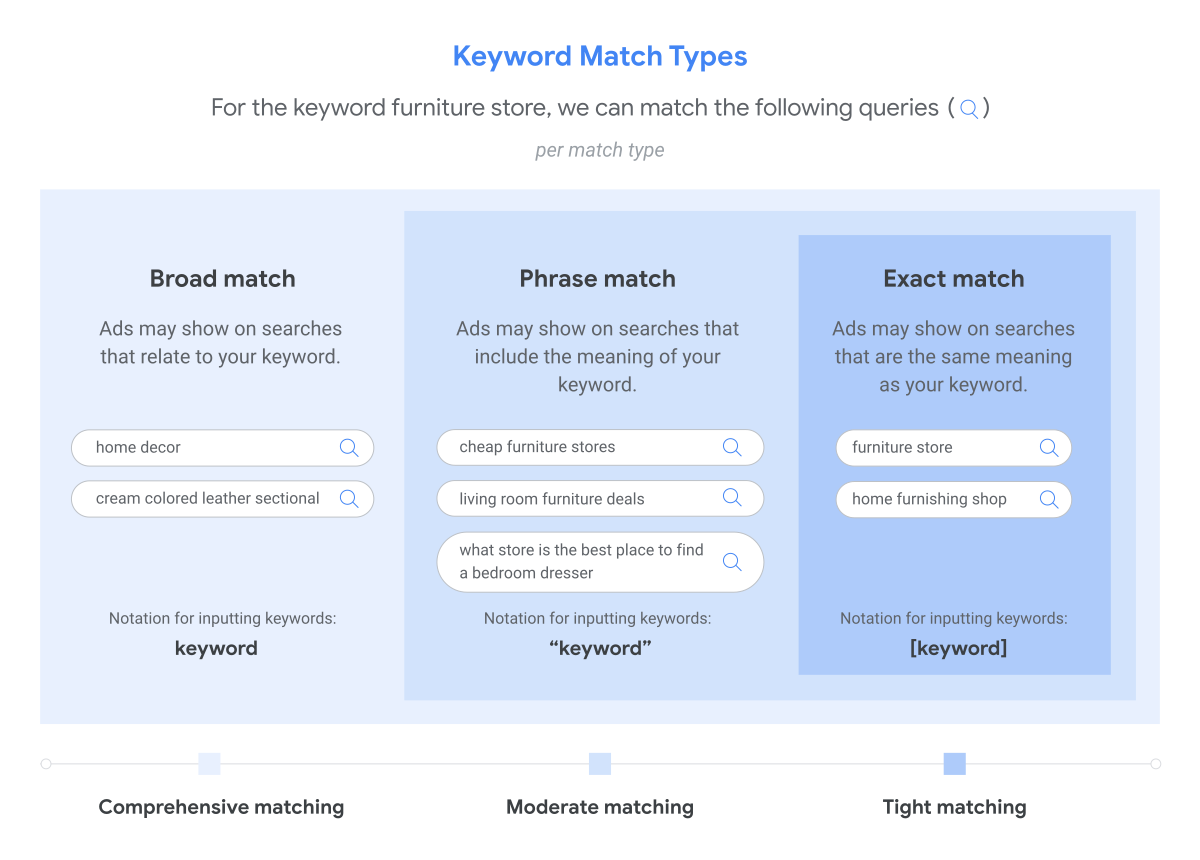You are running ads for your business and managing the campaign. But still not seeing any positive results? What is the reason behind it?
It commonly happens when you waste money on an audience that’s too cold. Nurturing your potential customers is crucial, but you must do everything strategically to get results from your ads.
That’s why using Keyword Match Types is more important than ever.
It allows brands to build ads that are closely relevant to users’ search queries. It can boost cost per conversion and increase customer loyalty if used correctly.
The goal is not just running ads but ensuring they are in front of the right audience so you can gain maximum ROI. But what are keyword match types, and how do they work?
Keep reading because we will cover everything in this guide. So, let’s get started.
How Each Keyword Match Type Works & Its Types
Each match type has a specific purpose. Choosing the right one can take your PPC campaign to the next level. However, if you choose the wrong keyword match type, results can backfire, and ad spend will go down the drain.
So here’s a detailed look at each match type and how it works.
Broad Match: Expanding Your Reach
With broader-match keywords, you can reach a wider audience. Broader-match keywords trigger your ads for user searches that include relevant terms, synonyms, or close variations of your keyword.
So, your keyword doesn’t need to match 100% with the user search. If it fits any related keyword, it will appear in the search.
Let’s understand with an example.
You are the owner of an all-inclusive resort and running a PPC campaign. If you use all-inclusive resorts as a broad match keyword, your ad may display for searches like All-inclusive Vacations, Resort Packages, or Luxury Vacations. These alternative keywords will bring high traffic because you are reaching a broader audience.
Phrase Match: Targeting Specific Intent
These provide a moderate level of targeting control. Your ad only appears if the search query includes your keyword phrase in the same order. However, other words may be added before or after the phrase.
Look at this example for further clarity.
If your phrase keyword type is all-inclusive resorts, your ad could appear for searches like Best All-inclusive Resorts In Mexico or All-inclusive Resorts Near Me.
However, it will not show for searches like Resorts that Include Everything or Best Luxury Resorts because the exact keywords or phrases do not match.
Exact Match: Reaching High-Intent Users
These match types offer the highest level of control over your ad. It shows your ad only when the search query exactly matches your keyword or a close variant (like a plural form or misspelling). Since it is highly specific, your ad will only appear in front of audiences whose search intent aligns closely with your offering.
Want to learn with an example?
If your keyword is caribbean vacation, the ad will show only for close matches, such as Caribbean Vacations or slight misspellings. It’s a great way of avoiding irrelevant clicks from broader terms like Caribbean Travel Deals.

Source – support.google
Negative Keywords To Filter Out Unwanted Traffic
Negative keywords work differently than the three primary match types. Through this, adversities can exclude specific phrases or keywords. But why should you do that?
Your ad will not appear in searches that are irrelevant to your offering. So here is what happens.
Use Negative Keywords → Exclude Phrases → Ad Does not Show In Irrelevant Traffic → Attract Qualified Leads → High Conversion Rate.
Let us understand with an example.
Suppose you are running a resort that does not cater to families. You should add “family-friendly” as a negative keyword to avoid appearing in searches that might not convert well. That way, you will not get any unqualified leads.

Source – karooya
Which Keyword Match Type Is Ideal for Your PPC Strategy?
Now, you might wonder if a broad match type is best for your PPC campaign or if you should try a phrase match. To clarify this, here are the benefits of each keyword match type. Observe which aligns with your business goals and then decide accordingly.
- Broad Match: This is ideal to increase visibility and reach. However, be cautious while implementing it so you do not waste your budget on unrelated searches. To counter this, add negative keywords.
- Phrase Match: It is extremely helpful if you want to get attention from users with super-specific intent while allowing some flexibility. You can target ideal audience segments without limiting the reach.
- Exact Match: It is useful for campaigns through which you want to achieve high-conversion searches. However, it limits the reach but is heavily focused on generating high-quality leads. It has a high return on ad spend (ROAS) because the intent aligns with the product or service.
The ideal solution is to combine all the keyword match types in a balanced way to attain precision and high reach. You should test various combinations and closely monitor the performance of the PPC campaign. This helps you fine-tune your strategy.
How To Modify Keyword Match Types In Google Ads
By now, you have clarity on keyword match types. But what if you want to modify them?
You should use this step-by-step method to modify keyword match types in Google ads.
- Log in to your Google Ads account and click on Campaigns or Ad Groups.
- Tap on the Keywords section and type your new keywords.
- Here, you need to use specific syntax to set match types.
- Broad: No punctuation, e.g., vacation packages in Mexico.
- Phrase: Use quotation marks, e.g., “vacation packages in Mexico.”
- Exact: Enclosed in square brackets, e.g., [vacation packages in Mexico].
- Click on Save to confirm all the changes.
- Keep monitoring the performance to ensure ad spend aligns with campaign goals.
Remember, relevant traffic is better than high unfocused traffic. Audience search behavior tells which type of traffic is ideal for high-quality clicks.

Source – support.google
Furthermore, you can use keyword research tools to target keywords for search campaigns. However, be aware of the keyword intent and make a negative keyword list for better campaign performance.
Make Your PPC Campaign Successful With Keyword Match Types
Understanding how keyword match types work will ensure your ad reaches the right people. Monitor the PPC campaign regularly and adjust accordingly. Target intent-driven searches and minimize clicks from irrelevant queries.
It allows you to make informed choices that improve ad effectiveness. This ultimately leads to more qualified leads and makes the most of every advertising dollar. Identify your target audience size and budget for advertising campaigns. Eliminate all the unfocused audiences so you don’t attract the wrong audience.
Do you want expert guidance on how to handle your PPC campaign? Then you are at the right place. Brick Mortar Digital is a leading marketing agency helping businesses grow with PPC ad campaigns. So, if you want to grow your business, get in touch with us today.




